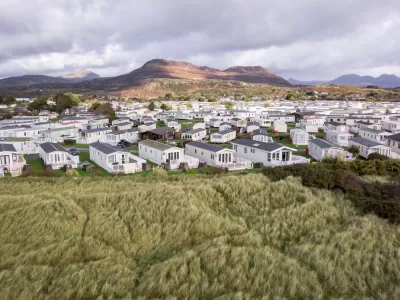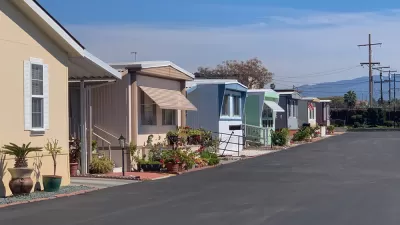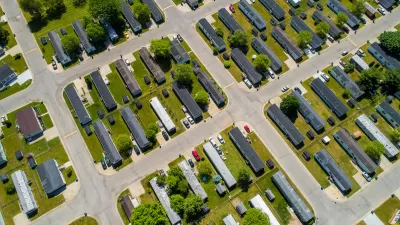Making it easier for mobile home park residents to collectively purchase the land they live on can protect their housing affordability for the long term.

“Because they don’t own the land beneath their homes, mobile home residents are at the mercy of the park’s owners, who could raise their rents or even shut down the park altogether as the land is redeveloped,” writes Kevin Hardy in Stateline. As more investors buy up mobile home parks, the resident ownership model is a key tool in the fight to keep this housing type affordable.
Coming together to buy one of these parks can be a daunting task for residents — but that could be changing. “Earlier this year, the federal government made available $225 million in grants for improvements at mobile home communities, including those owned by residents, and announced plans to allow resident-owned parks to access federally insured financing to keep rents low or make improvements.” These steps could pave the way for more cooperatively owned parks and protect residents from steep land rent hikes.
According to Hardy, “Currently, 22 states have laws requiring or encouraging owners of manufactured home parks to give homeowners the opportunity to purchase their land collectively. Those laws can vary wildly, with some requiring that the residents be given the right of first refusal, while others simply require park owners to provide notice of their intent to sell.” Some industry groups are pushing back, arguing that resident ownership is not always in the best interest of the residents.
Manufactured housing can cost as much as 45 percent less to build per square foot than site-built homes, making them an affordable option for lower-income households, but are often regulated out of neighborhoods largely due to unwarranted stigma. Now more states, including Maine and New Jersey, are enacting or strengthening laws aimed at encouraging collective ownership of mobile home parks and allowing manufactured housing in all residential neighborhoods.
FULL STORY: To save affordable housing, states promote resident-owned mobile home parks

Alabama: Trump Terminates Settlements for Black Communities Harmed By Raw Sewage
Trump deemed the landmark civil rights agreement “illegal DEI and environmental justice policy.”

Planetizen Federal Action Tracker
A weekly monitor of how Trump’s orders and actions are impacting planners and planning in America.

The 120 Year Old Tiny Home Villages That Sheltered San Francisco’s Earthquake Refugees
More than a century ago, San Francisco mobilized to house thousands of residents displaced by the 1906 earthquake. Could their strategy offer a model for the present?

Ken Jennings Launches Transit Web Series
The Jeopardy champ wants you to ride public transit.

BLM To Rescind Public Lands Rule
The change will downgrade conservation, once again putting federal land at risk for mining and other extractive uses.

Indy Neighborhood Group Builds Temporary Multi-Use Path
Community members, aided in part by funding from the city, repurposed a vehicle lane to create a protected bike and pedestrian path for the summer season.
Urban Design for Planners 1: Software Tools
This six-course series explores essential urban design concepts using open source software and equips planners with the tools they need to participate fully in the urban design process.
Planning for Universal Design
Learn the tools for implementing Universal Design in planning regulations.
Clanton & Associates, Inc.
Jessamine County Fiscal Court
Institute for Housing and Urban Development Studies (IHS)
City of Grandview
Harvard GSD Executive Education
Toledo-Lucas County Plan Commissions
Salt Lake City
NYU Wagner Graduate School of Public Service





























